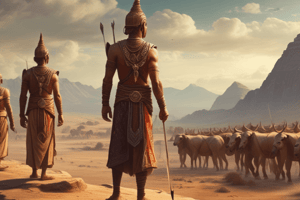Podcast
Questions and Answers
What is the Aryan debate concerned with?
What is the Aryan debate concerned with?
The origins of the Vedic people and their migration to the Indian subcontinent.
Who proposed the Aryan invasion theory?
Who proposed the Aryan invasion theory?
Western scholars in the 19th century.
What is the basis of the Aryan invasion theory?
What is the basis of the Aryan invasion theory?
Linguistic and cultural similarities between ancient Indian and European societies.
What has been the criticism of the Aryan invasion theory?
What has been the criticism of the Aryan invasion theory?
What do genetic studies suggest about the Indian population?
What do genetic studies suggest about the Indian population?
What is the 'Out of India' theory?
What is the 'Out of India' theory?
What is the 'Indigenist' theory?
What is the 'Indigenist' theory?
What is the 'Migration' theory?
What is the 'Migration' theory?
Why was the Aryan invasion theory used by the British?
Why was the Aryan invasion theory used by the British?
What was the result of the Aryan invasion theory on Indian history and culture?
What was the result of the Aryan invasion theory on Indian history and culture?
Study Notes
The Aryan Debate
Overview
- The Aryan debate refers to the controversy surrounding the origins of the Vedic people and their migration to the Indian subcontinent.
- The debate revolves around the idea of an "Aryan invasion" or "Aryan migration" and its implications on Indian history and culture.
The Aryan Invasion Theory
- Proposed by Western scholars in the 19th century, this theory suggests that a group of Indo-European speaking people, called Aryans, invaded the Indian subcontinent and displaced the indigenous Dravidian people.
- The theory was based on linguistic and cultural similarities between ancient Indian and European societies.
- The Aryan invasion theory was used to justify British colonial rule in India, implying that the British were also a superior race that had a right to rule over the native Indians.
Criticisms and Challenges
- The Aryan invasion theory has been widely criticized and challenged by Indian scholars and historians.
- Lack of archaeological evidence to support the invasion theory, such as the absence of any signs of violence or destruction in the Indus Valley Civilization.
- The theory is based on linguistic and cultural similarities, which can be explained by other factors such as trade and cultural exchange.
- The idea of a single Aryan invasion is not supported by genetic studies, which suggest that the Indian population has a complex and diverse ancestry.
Alternative Theories
- The "Out of India" theory, which suggests that the Indo-European languages originated in the Indian subcontinent and spread to other parts of the world.
- The "Indigenist" theory, which proposes that the Vedic people were indigenous to the Indian subcontinent and that there was no Aryan invasion or migration.
- The "Migration" theory, which suggests that there was a gradual migration of people from Central Asia to the Indian subcontinent, rather than a sudden invasion.
Implications and Significance
- The Aryan debate has significant implications for Indian history, culture, and identity.
- The debate has been influenced by political and ideological agendas, with some groups using it to promote nationalist or religious ideologies.
- A nuanced understanding of the Aryan debate is essential for a more accurate and inclusive understanding of Indian history and culture.
The Aryan Debate
Overview
- The Aryan debate revolves around the origins of the Vedic people and their migration to the Indian subcontinent.
- The debate involves the idea of an "Aryan invasion" or "Aryan migration" and its implications on Indian history and culture.
The Aryan Invasion Theory
- Proposed by Western scholars in the 19th century, the theory suggests that a group of Indo-European speaking people, called Aryans, invaded the Indian subcontinent and displaced the indigenous Dravidian people.
- The theory was based on linguistic and cultural similarities between ancient Indian and European societies.
- The Aryan invasion theory was used to justify British colonial rule in India, implying that the British were also a superior race that had a right to rule over the native Indians.
Criticisms and Challenges
- The Aryan invasion theory has been widely criticized and challenged by Indian scholars and historians.
- Lack of archaeological evidence to support the invasion theory, with no signs of violence or destruction in the Indus Valley Civilization.
- The theory is based on linguistic and cultural similarities, which can be explained by other factors such as trade and cultural exchange.
- Genetic studies suggest that the Indian population has a complex and diverse ancestry, contradicting the idea of a single Aryan invasion.
Alternative Theories
- The "Out of India" theory suggests that the Indo-European languages originated in the Indian subcontinent and spread to other parts of the world.
- The "Indigenist" theory proposes that the Vedic people were indigenous to the Indian subcontinent and that there was no Aryan invasion or migration.
- The "Migration" theory suggests that there was a gradual migration of people from Central Asia to the Indian subcontinent, rather than a sudden invasion.
Implications and Significance
- The Aryan debate has significant implications for Indian history, culture, and identity.
- The debate has been influenced by political and ideological agendas, with some groups using it to promote nationalist or religious ideologies.
- A nuanced understanding of the Aryan debate is essential for a more accurate and inclusive understanding of Indian history and culture.
Studying That Suits You
Use AI to generate personalized quizzes and flashcards to suit your learning preferences.
Description
Explore the controversy surrounding the origins of the Vedic people and their migration to the Indian subcontinent. Delve into the Aryan invasion theory and its implications on Indian history and culture.




